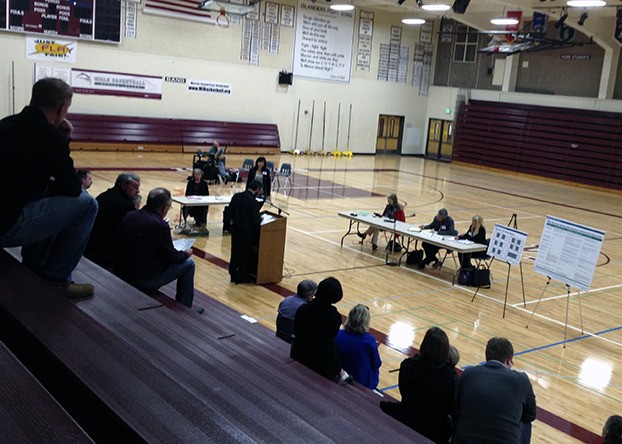Hundreds turned out for a meeting on the potential tolling of I-90 at Mercer Island High School Monday night. After a disorganized round of public comments back in January, the Washington State Department of Transportation set aside four hours for statements, and found the biggest open space on the Island, a high school gymnasium.
Attendees were resoundingly opposed to the tolling of I-90, most questioning the legality of tolling the Interstate to fund another project. State Route 520 is looking for roughly $1.5 billion to complete the Interstate 5 section to Medina.
“This is not about Mercer Island. This is not just about the people who live here” said Wayne Perryman, a resident of the Island. “My concern, and I’m sorry that the media is not here, because they took a lot of film of white people here talking about Mercer Island. But they’re not here to talk about the impact this would have on the ethnic minorities in Seattle that use I-90 every day to go to school and to go to work.”
Perryman’s statement was met with applause. He noted Bellevue College’s large minority population and the number of students commuting into work and class. Many residents questioned WSDOT’s outreach with the public and the scope of the EIS, which speakers claimed had been too narrowly focused on the I-90 corridor, instead of addressing the ripple effects to other Eastside communities, even South Seattle and further east in the state.
Closer to home, Dan Grausz, Deputy Mayor of Mercer Island who is running for reelection this fall, said he couldn’t help but wonder what football games at Mercer Island High would look like if opposing teams had to pay for the trip across. He questioned also, if people would continue to patronize student programs and concerts and whether the Island’s large elderly population would receive as many visits from family and friends.
Principal Anca Wilson of St. Monica’s Catholic School said tolls would devastate the teachers and student body. While Mercer Island is typically associated with its affluent residents, Wilson said that 60 percent of the school’s families came from off-Island. Tolling I-90 would present an additional $1,200 in expenditures for families already struggling to make ends meet, she said.
“It would be an unjust burden to those who benefit the most from these services,” said Wilson.
Though attendees expressed frustration with WSDOT’s scarce alternatives, a number of people voiced approval for a gas tax increase. Others suggested decreasing the toll on SR-520, to divert more traffic off I-90, consequently generating more revenue. Several speakers took issue with the labeling of I-90 as a part of a “cross-lake corridor,” a definition they said had been contrived to justify tolling.
Outside the gymnasium display boards and tables were set up for comment writing, and WSDOT employees answered questions. Craig Stone, tolling director for WSDOT emphasized during introductions that the state Legislature will have the final decision on tolling and that the Federal Highway Administration must also sign off. When attendees briefly disrupted the public comment format to question the legality of tolling the Interstate, Lindsey Handel a representative for the Federal Highway Administration deferred her answer.
“I love this community,” said West Seattle resident John Parker toward the end of the meeting. Parker was managing the sound system at Monday night’s meeting and said he worked at Mercer Island High School in his spare time. If I-90 was tolled: “People like me, we’ll go elsewhere. We’ll have no choice.”
Tolls could be authorized by the Legislature in 2015 and might begin as early as 2016. Another public meeting is scheduled for tonight at the Northwest African American School in Seattle, from 4 to 7 p.m.


